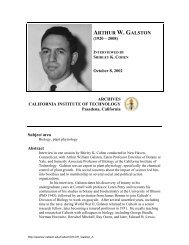Interview with Thomas A. Tombrello - Caltech Oral Histories
Interview with Thomas A. Tombrello - Caltech Oral Histories
Interview with Thomas A. Tombrello - Caltech Oral Histories
You also want an ePaper? Increase the reach of your titles
YUMPU automatically turns print PDFs into web optimized ePapers that Google loves.
<strong>Tombrello</strong>–187<br />
<strong>with</strong> those that already have models, but not have their own models. The climate models are<br />
limited at best. The observations are tricky.<br />
ASPATURIAN: When you speak of the climate models, you’re talking about global warming and<br />
the oil-production peaks, and that sort of thing?<br />
TOMBRELLO: Oh, the oil-production peaks are a separate thing. I know a little bit more about<br />
that. I talked a little bit about King Hubbert and seeing him when I was just out of college<br />
[Session 1]. I’m a great peak-oil person. I truly believe in it. I believe in the models. I don’t<br />
think there is much else you can do there. I’m very much a fan of what David Rutledge is doing.<br />
He’s looking at applying the same techniques to world coal production. To make a long story<br />
short, everybody worries about the amount of CO 2 you can make from burning coal, and that’s a<br />
legitimate worry over the short term. But if you look at what Rutledge has done—which I think<br />
is exceedingly important, maybe underappreciated; I’m one of his greatest fans—the good news<br />
is that there isn’t enough coal to make as much CO 2 as the extremists think, and the bad news is<br />
there won’t be that much energy, either. So, since there is less fossil fuel that you can get at<br />
efficiently, it won’t make as much CO 2 , but we may all get pretty cold. [Laughter]<br />
ASPATURIAN: Are you involved in any work looking at nuclear reactors as an energy source?<br />
TOMBRELLO: Years ago, more than twenty-five years ago, I was on a national committee to look<br />
at reactor accidents. In every nuclear reactor accident, human error played an enormous role, if<br />
not the only role. That is underappreciated. It means that the technology is a lot safer than<br />
people think. It’s a matter of training. But you do have to design the systems appropriately, and<br />
you have to train the people who operate the systems appropriately. I’m a fan of nuclear energy.<br />
I think there’s a lot of hype out there now about new types of reactors, where they have great<br />
concepts and no designs. The difference is that a concept is something that looks attractive, and<br />
you put a few numbers into it, but in no way could you take that and actually make an actual<br />
power plant. You could produce a concept for $10 million, $20 million. To do a design study<br />
for something that’s going to cost as much as a nuclear reactor or a reactor system, you might<br />
have to spend a billion dollars. And they haven’t done that. They’re going to have to think<br />
about that. This comes into the fusion problem, both for the magnetic confinement of fusion,<br />
http://resolver.caltech.edu/<strong>Caltech</strong>OH:OH_<strong>Tombrello</strong>_T

















